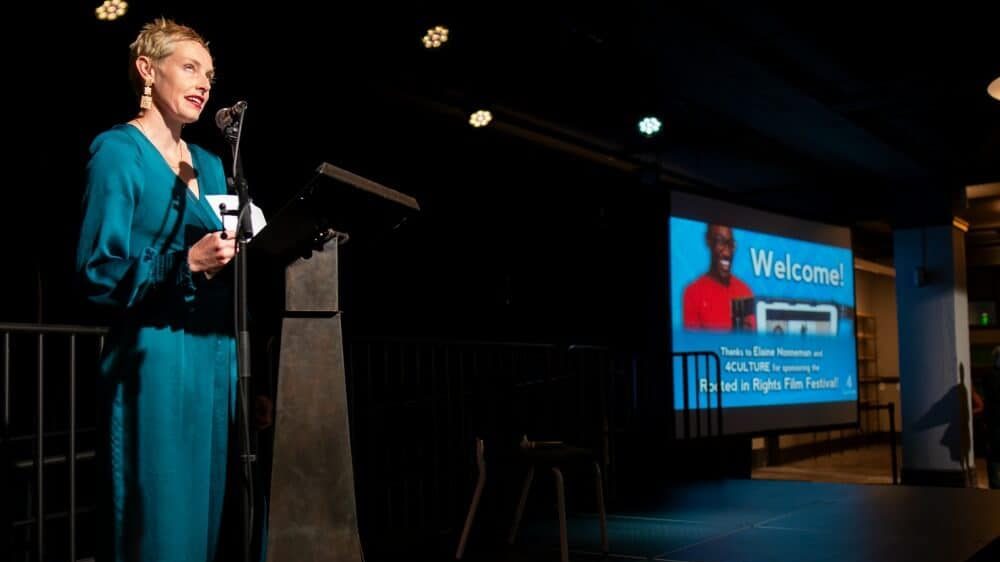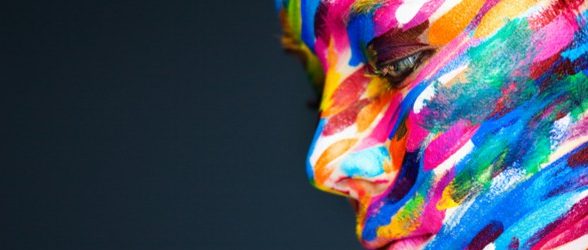I’m Not Sorry If My Disability Makes You Uncomfortable
This is a preview for our #ParentingWithoutPity event at Town Hall Seattle, which will take place on June 13 at 7:30pm. Tickets and directions on the Town Hall website.
I want to start by not apologizing. At a recent film festival event, I gave an intro to the program. My husband was in the audience that night, and was taking photos. He told me after that it was impossible to get a good photo of me because I was either looking at my notes, or straight up into the lights.
A younger version of myself would have been horrified at this. I spent the first 30 years of my life doing everything I could to not let people know I couldn’t see things. I ordered the same things at the fast food restaurant, I got dropped off a block away so nobody knew that my parents were driving me, I didn’t follow my dream to study medicine or be a scientist. That last one really stings, even now.
I remember the first day in my stats class at Stanford, I couldn’t see the overhead, even from the front row of the big lecture hall, and so I went up to the professor and asked for his notes. He said no, and told me I had to go to the Disability Center on campus to put in a request. I went, and they assigned me a notetaker – meaning that someone would go to a stats class (later I found out it was a class taught by an entirely different professor), take notes, and then a day or two later drop off a photocopy of them at the Disability Center office where I could pick them up and try to interpret them. Unsurprisingly, this wasn’t terribly helpful. For the first time in my life, I started failing a class. I dropped the class, and gave up my dream of being pre-med, or studying anything in a scientific field. I didn’t know I could go back and ask for more help, I was too ashamed of my lack of vision, and frankly, even though it was 2001, I didn’t even know the ADA existed.
Later in college, in an art class, I did a project about disability pride. I was so excited about the project – it felt so daring, so transgressive. But despite our campus being right across the bay from Berkeley and all the incredible disability activism that was centered there, no one in my circle helped me make that connection. And so I went back into the closet, so to speak, and spent the next 10 years trying to hide my disability.
It wasn’t until my son was born that I had a moment of reckoning. When he was diagnosed with the same eye condition, I had a breakdown. All the years of faking and concealing and trying harder to make up the difference, I just didn’t want that for him. And the only way I was going to break that cycle was to own my disability. To be public and proud and to be able to ask for the accommodations I need.
I wish my mom had known other adults with nystagmus. I wish I had known other disabled people growing up. I wish I had found the disabled activist community in college.
Parenting Without Pity came from that desire to allow disabled parents to share our knowledge – to really help inform and educate the parents of disabled children. Because we all want the best for our kids, but sometimes we just don’t know where to look, especially if our kids come into this world with a different body or mind than we’re adjusted to.
So I am not apologizing for looking at the lights tonight. It’s what my eyes do. If it makes you uncomfortable, I’m not sorry. I’d like to challenge you to re-examine this discomfort, or frankly any discomfort you get listening and watching our panel of experts tonight. Because if you’re a parent of a disabled child, you will be challenged. Of course, it’s your kid, you’re the parent. But sometimes it’s important to recognize that other people may know something about the way your kid experiences the world, and that if you listen, you can learn from us.
About Rooted In Rights
Rooted in Rights exists to amplify the perspectives of the disability community. Blog posts and storyteller videos that we publish and content we re-share on social media do not necessarily reflect the opinions or values of Rooted in Rights nor indicate an endorsement of a program or service by Rooted in Rights. We respect and aim to reflect the diversity of opinions and experiences of the disability community. Rooted in Rights seeks to highlight discussions, not direct them. Learn more about Rooted In Rights




I LOVE the message that this Momwith a disabiyis offering, in an effort to empower other parents of children with disabilities, but I am profoundly bothered when I see documents or speeches written by folks who are trying to advocate about & for people with disabilities while using language that isn’t “person first.” I ask you & everyone, as a parent of two adult children with disabilities and as a professional who works on behalf of older adults and people with disabilities, PLEASE use person first language!!!
Many disabled people prefer identity-first language (e.g., black person, white person, disabled person, gay person, straight person, autistic person, neurotypical person, deaf person, hearing person, blind person, sighted person), even though sometimes that makes their parents or caregivers uncomfortable. And many people with disabilities prefer person-first language (person with blindness, person with gayness, person with straightness, person with autism, person with neurotypicality, person with deafness, person with hearing). The proper thing to do is to find out what a person prefers to be called, and call them that.
https://autisticadvocacy.org/about-asan/identity-first-language/
https://news.northeastern.edu/2018/07/12/unpacking-the-debate-over-person-first-vs-identity-first-language-in-the-autism-community/
Lila, it should be left up to the person the language is being applied to. I am autistic and do not like “person first” language for myself. Autism is a part of me, it is a part of who I am, I am autistic. I do not just “have” autism the way one has a cold. It is written in my DNA and is inseparable from my identity. But if a person with autism feels differently, and feels that they do not wish to be tied to their diagnosis like that, then that should absolutely be respected and person-first language must be applied. I know many fellow autists that do not prefer person-first language for many reasons, and just a handful of folks that do prefer it. Allistic (non-autistic) people often advocate for us on this matter without even asking us autistics how we feel about it, effectively taking our voices away and speaking for us once again. Our autonomy is repeatedly violated in an attempt to advocate for us, because it is assumed that we do not know what is best for us.
I implore you to learn, from those you advocate for, what they actually prefer.
Thank you so much for your hard work.
Truth. My adult son prefers to be referred to as an “autistic person” rather than a “person with autism”. He says the latter form makes it sound like a disease to be cured, separate from him. He considers his autism intrinsic to his identity, and a difference rather than a disability.
No offense intended whatsoever but as a person with a physical disability I find “Person with a Disability” and “Disabled Person” to be EXACTLY the same term in meaning so please, please let disabled people use the language they want and please move on to bigger fish to fry in disability rights that have more urgent life and death consequences.
I am both a disabled woman, and like you, a professional who works in the field of disability. Person first language, while preferred by some in the Disability Community, is most often promoted by those without disabilities. While well-meaning, it does not always take into account the wishes of those actually IN the Disability Community, like me. I prefer identity first language. My disabilities are part of my identity–without them, I would be an entirely different person. I don’t identify as a person with womanness…I identify as a woman. Neither do I identify as a person with a disability…I identify as disabled.
It feels patronizing when someone else tries to tell me how I should identify and what I should call myself. I know that usually isn’t how it is intended, but intentions aside, I, and other disabled individuals, are perfectly capable of determining how we prefer to identify. I would never deign to tell another member of the disability community how to identify and I ask to be treated with the same dignity and respect.
As a disabled person who is very familiar with college accessibility I find it so disappointing and harmful to the entire campus when disabled students do not use accessibility services. So I wish Anna felt more comfortable about disclosing.
I have nystagmus! I have had prisms when I was 5 and bifocal lenses up until now (I’m no longer on prisms). I still can use glasses to see and have 20/40 or 20/45 vision with corrective lenses which is unheard of for someone with nystagmus. I STILL ALWAYS ZOOM MY COMPUTER TO 200% AND DO THIS AT WORK. And for YEARS I felt ashamed like I had to hide it because I couldn’t see. I’ve only recently begun to own my disabilities (I am also deaf in my left ear and wear an implant plus a bajillion different other disabilities like POTS, epilepsy, Autism, Fatty Liver Disease, Hypotonia, Chronic Pain, I have a mitochondrial disorder complex 1 that causes all this things, and of course mental health issues-unsurprisingly)
Thank you! Thanks for this!!!!! I want to meet more young women with nystagmus!!!!! CARRY ON!!!!!! <3 <3 <3